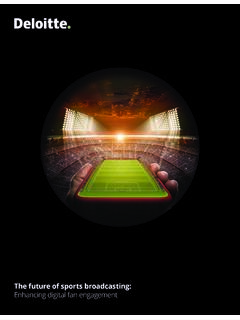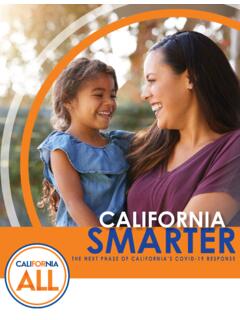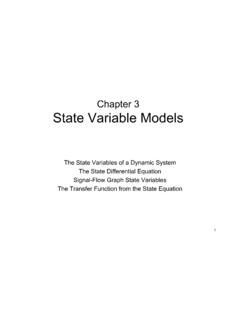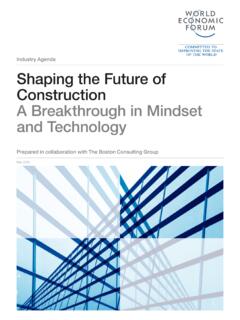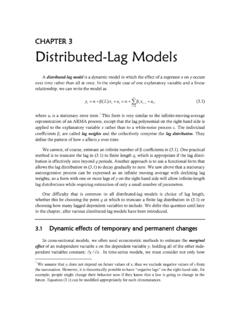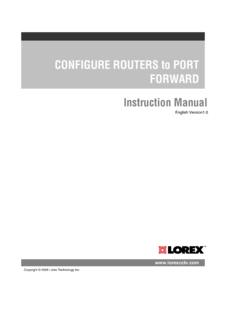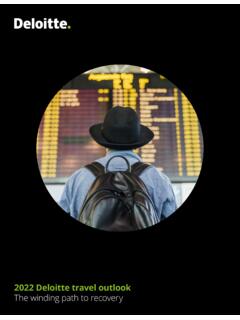Transcription of The Future of Money - OECD
1 ISBN 92-64-19672-203 2002 01 1 P2000 The Future of Money The Future of MoneyThe Future of MoneyMoney's destiny is to become digital. Throughout the ages physical Money in theform of objects, coins and notes has increasingly been replaced by more abstractmeans of payment such as bills of exchange, cheques and credit cards. In theyears to come that trend to virtual Money will continue apace. As technologicaladvances in ICT and biometrics come on-stream, as intangibles progressivelybecome the primary source of value-added in the burgeoning knowledgeeconomy, and as the public at large come to grasp the advantages of digitaltransactions, virtual forms of payment will dominate.
2 How quickly will this happenon a major scale, and will cash disappear altogether? How will it affect our dailylives? Will it deepen already existing rifts in society? Does virtual Money threatencontrol of the Money supply, raising the spectre of greater inflationary risks? Or will it put central banks out of business? This book tackles these and manyother critical questions, offering timely suggestions on why and how to make thetransition to the world of digital :HSTCQE=V^[\W] 's books, periodicals and statistical databases are now available via ,our online book is available to subscribers to the following SourceOECD themes:General Economics and Future StudiesAsk your librarian for more details of how to access OECD books online, or write to us at OECD, 2002.
3 Software: 1987-1996, Acrobat is a trademark of rights reserved. OECD grants you the right to use one copy of this Program for your personal use reproduction, lending, hiring, transmission or distribution of any data or software isprohibited. You must treat the Program and associated materials and any elements thereof like any othercopyrighted requests should be made to:Head of Publications Service,OECD Publications Service,2, rue Andr -Pascal, 75775 Paris Cedex 16, Future of MoneyORGANISATION FOR ECONOMIC CO-OPERATION AND DEVELOPMENTORGANISATION FOR ECONOMIC CO-OPERATIONAND DEVELOPMENT Pursuant to Article 1 of the Convention signed in Paris on 14th December 1960,and which came into force on 30th September 1961, the Organisation for EconomicCo-operation and Development (OECD) shall promote policies designed.
4 To achieve the highest sustainable economic growth and employment and arising standard of living in Member countries, while maintaining financialstability, and thus to contribute to the development of the world economy; to contribute to sound economic expansion in Member as well as non-membercountries in the process of economic development; and to contribute to the expansion of world trade on a multilateral, non-discriminatory basis in accordance with international original Member countries of the OECD are Austria, Belgium, Canada,Denmark, France, Germany, Greece, Iceland, Ireland, Italy, Luxembourg, theNetherlands, Norway, Portugal, Spain, Sweden, Switzerland, Turkey, the UnitedKingdom and the United States.
5 The following countries became Memberssubsequently through accession at the dates indicated hereafter: Japan(28th April 1964), Finland (28th January 1969), Australia (7th June 1971), NewZealand (29th May 1973), Mexico (18th May 1994), the Czech Republic(21st December 1995), Hungary (7th May 1996), Poland (22nd November 1996),Korea (12th December 1996) and the Slovak Republic (14th December 2000). TheCommission of the European Communities takes part in the work of the OECD(Article 13 of the OECD Convention).
6 Publi en fran ais sous le titre :L avenir de l argent OECD 2002 Permission to reproduce a portion of this work for non-commercial purposes or classroomuse should be obtained through the Centre fran ais d exploitation du droit de copie (CFC),20, rue des Grands-Augustins, 75006 Paris, France, tel. (33-1) 44 07 47 70, fax (33-1) 46 34 67 19,for every country except the United States. In the United States permission shouldbe obtained through the Copyright Clearance Center, Customer Service, (508)750-8400,222 Rosewood Drive, Danvers, MA 01923 USA, or CCC Online: All otherapplications for permission to reproduce or translate all or part of this book should be madeto OECD Publications, 2, rue Andr -Pascal, 75775 Paris Cedex 16, France.
7 3 OECD 2002 ForewordLooking to the next few decades, technological advances combined with fairlydramatic economic and social changes could create conditions for the emergenceof new, virtual forms of Money and credit. On the positive side these digital formsof Money could help to create more efficient and more global economies andsocieties. On the negative side tomorrow s new forms of Money could make it easierto engage in anti-competitive behaviour; exacerbate exclusion and inequality;foster economic volatility; facilitate criminal activity; and even undermine theeffectiveness of macroeconomic policy.
8 To examine these issues and advance the dialogue among high-ranking gov-ernment officials, business leaders and academics, an OECD Forum for the Futureconference was held in Luxembourg on 11-13 July 2001. The conference had twoprimary aims: first, to explore the interrelationship between new forms of moneyand technological, economic and social change; and second, to consider the impli-cations for leadership in the public and private sectors. The conference was organised around three sessions. The first set the stageby looking back to historic developments, and forward to the technologies thatcould influence Future forms of Money .
9 The second examined how interactionsover the next few decades between new forms of Money and economic and socialchanges could give rise to a wide range of new opportunities and risks. Finally, thethird considered the ways in which public and private sector decision makersmight encourage synergy between new forms of Money and technological, economicand social conference was opened on 11th July in the H micycle europ en of theKirchberg Conference Centre by Ms Lydie Polfer, Vice Prime Minister and Ministerof Foreign Affairs and External Trade of Luxembourg; introductions to the theme ofthe conference were given by Mr Donald J.
10 Johnston, Secretary-General of theOECD, and by Mr Luc Frieden, Luxembourg s Minister of Treasury and Budget. Allthree speeches delivered on this occasion are reprinted in this opening event was attended by several hundred people from variousprofessional walks of life government officials, bankers, other financial experts,The Future of Money 4 OECD 2002economists, consultants, researchers, university teachers, entrepreneurs, journalists,and many more from all over the conference benefited from special sponsorship by the Luxembourg Gov-ernment, the Luxembourg Bankers' Association (ABBL)










